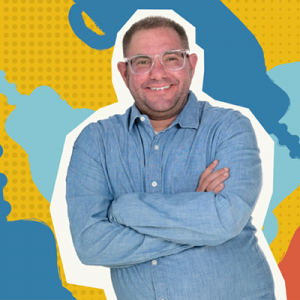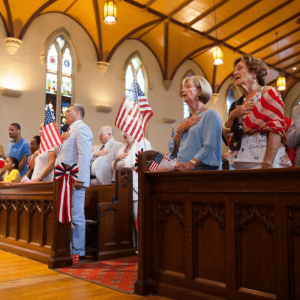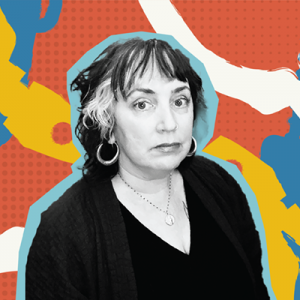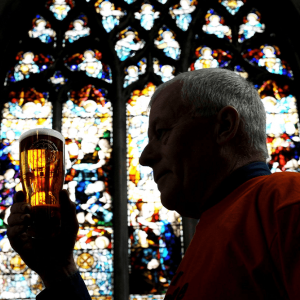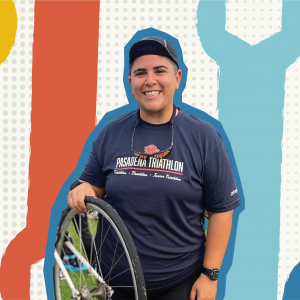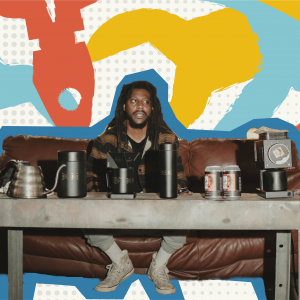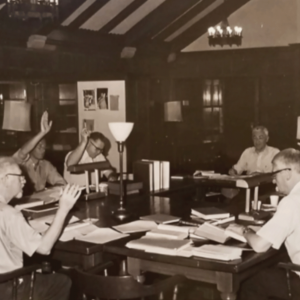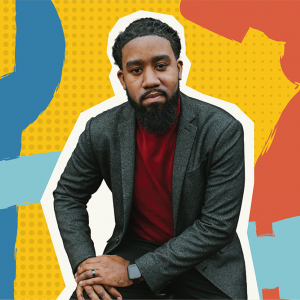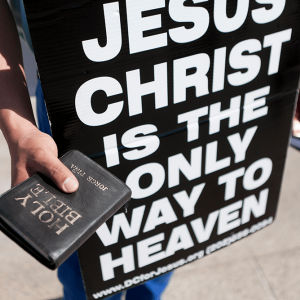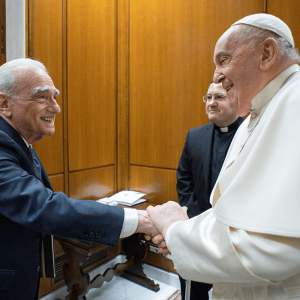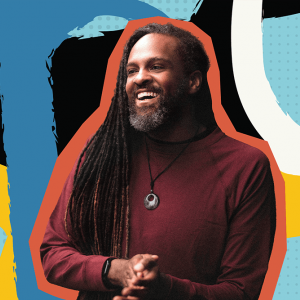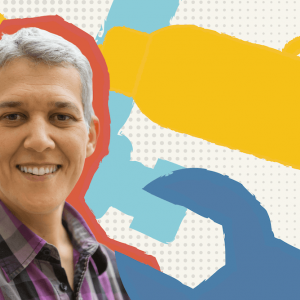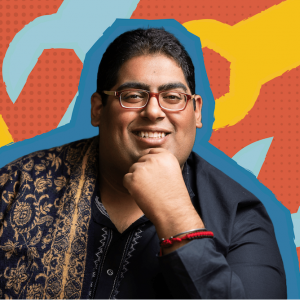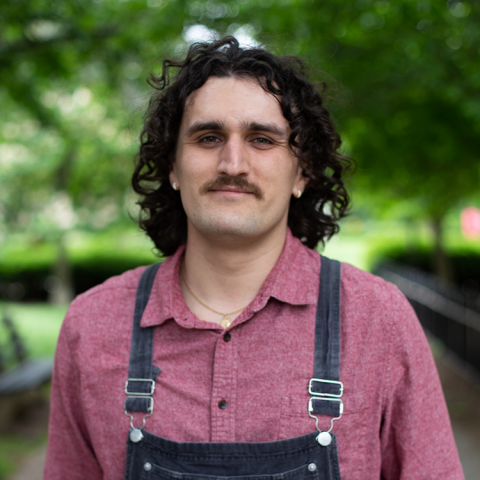
Mitchell Atencio is the senior associate news editor at Sojourners. He first served as a contract reporter for Sojourners in 2020.
Mitchell believes his role as a journalist is to ask compelling questions of the right people and to tell stories that impact the actions of readers. He loves writing stories of the radical or unique — especially within faith. Before joining Sojourners, Mitchell was a reporter in Kirkland, Wash. At Arizona State University he was a passionate and dedicated member of the award-winning, independent, student-newspaper The State Press. He also graduated with a degree in journalism and mass communications, but he doesn’t care as much about that part.
Although he didn’t stay long enough, Mitchell is proud to have been born in Atlanta and dreams of returning.
In journalism and elsewhere, Mitchell advocates for the physical medium. He is a vinyl record collector; a film photographer who shoots, develops, and scans his own film; a magazine subscriber; and a fan of writing letters on the family typewriter. In his spare time, he reads liberation theology, practices Zen, watches a lot of tennis, rants about the evils of pickleball, and makes coffee with a variety of methods. Mitchell is discalced out of religious commitment; he concedes it probably makes him a hippie.
Posts By This Author
A Trans Priest Wants To Help Men Through the Masculinity Crisis
By now, you may know that men, broadly speaking, are suffering. Despite the structure of a patriarchal society where men still reap various financial and social benefits, men are regularly facing disparate outcomes on a wide range of measures. Nearly four times as many men as women died by suicide in the U.S., 1 in 7 men report having no close friends, and men see disparate outcomes in mental health, premature deaths, and education.
Trump Falsely Claimed That ‘Everyone’ — Including Faith Leaders — Opposed Roe
Faith leaders have supported abortion rights since before 1973, but after Roe, even some theologically conservative denominations supported the ruling.
Are You Accidentally a Christian Nationalist?
At the beginning of their book, Baptizing America, Brian Kaylor and Beau Underwood return to the Christian nationalist display at the U.S. Capitol on Jan. 6, 2022. No, that’s not a typo.
Kaya Oakes: The Failures of American Christian Forgiveness
"A lot of psychologists, sociologists, and theologians talk about the fact that forgiveness is really for the forgiver and not the person being forgiven. But that’s not true in a lot of our American narratives [where] forgiveness is actually for the person who did the wrong, so they can be “healed.” We’ve lost the victims in that conversation."
Is It Harder to be Sober in Progressive Churches?
Last week, the University of Michigan announced that it would begin selling alcohol at its football games.
For decades, alcohol sales had been largely limited at college football events, but in 2019 the Southeastern Conference began allowing its schools to sell alcohol at games. Now, more than 80 percent of the top football schools sell alcohol on game day.
In the U.S. church, opinions on alcohol seem more polarized than politics. On the one hand, many conservative and fundamentalist faith traditions treat all alcohol consumption as a sin, some going so far as to suggest that Jesus turned water into nonalcoholic wine. On the other, progressive and moderate faith traditions incorporate alcohol into church with events like beer-and-hymns, theology-on-tap, and “pub churches.”
Do Churches Need a Sports Ministry?
Only 1 in 4 adults play sports each year, according to a 2015 study from NPR, the Robert Wood Johnson Foundation, and Harvard University’s T.H. Chan School of Public Health. This is despite nearly three in four respondents reporting playing as kids, and a majority of adults saying sports improved their mental and physical health ... Ashley Lynn Hengst sees opportunities for the church to help decrease those disparities and build space for more people of all ages to play sports. Hengst serves in pastoral care at All Saints Church in Pasadena, Calif., after a decade working for the Y in youth development.
How to Make Your Daily Coffee Sacred and Just
Every few months, a headline flashes across my news feed: “Climate change could destroy the coffee industry,” or something similar.
Even as a regular coffee drinker, what concerns me isn’t the change to my morning cup, it’s the lives and livelihoods of the farmers who plant, grow, cultivate, and prepare my coffee beans. The majority of coffee is grown in the global South, which is alsobearing the brunt of climate change. Meanwhile, a majority of the world’s carbon dioxide emissions also come from the global North.
Can Christian Homophobia Really Be Traced to a Single Mistranslation?
“1946: The Mistranslation That Shifted Culture” only tells one part of the story about Christian bigotry against queer people.
WHEN THE FULL Revised Standard Version of the Bible was released in 1952, the translation used “young woman” instead of “virgin” in Isaiah 7:14, which so enraged conservatives like Rev. M. Luther Hux that he publicly burned that page of the Bible. This would not be nearly the most impactful RSV translation, however, as the new film 1946: The Mistranslation That Shifted Culture seeks to explain.
1946 (named for the year the RSV New Testament was released) aims to measure the drastic effects of the RSV being the first Bible translation to use the word “homosexual.”
The film follows the research by Kathy Baldock and Ed Oxford on the RSV translation, with supplementary scholarship from other academics who help explain the RSV’s rendering of the Greek words malakoi and arsenokoitai as “homosexual.” It also traces the cultural ripples of this translation, which the film asserts helped anti-LGBTQ+ Christians demonize and ostracize queer people. Finally, it shows the relationship between the film’s director Sharon “Rocky” Roggio, a lesbian, and her father Sal Roggio, a conservative pastor.
Translating portions of the Bible can be tricky business. As scholars note, arsenokoitai is a word with few other uses across the ancient world and may have been invented by the apostle Paul. Literally, it is a combination word that means “man who beds with males,” connotating a sexual usage. Malakoi means “soft,” and is understood as referring to “effeminate” men.
In the American Standard Version, a common translation that preceded the RSV, the translation used for arsenokoitai is “abusers of themselves with men.” The RSV later changed its translation to “sexual perverts,” though at the time, this was code for LGBTQ+ people. After the RSV, the New International Version used “men who have sex with men,” while the New Revised Standard Version used “sodomites.” The NRSV’s Updated Edition, released in 2021, uses “men who engage in illicit sex,” while noting that the meaning of the Greek is uncertain.
A Black Christian Approach to Veganism
Reverend Christopher Carter is a virtue ethicist, commissioned elder in the United Methodist Church, and professor of theology. He has spent much of his professional and personal life learning to better the treatment of animals as part of an integrated approach to justice for all. Carter, the author of The Spirit of Soul Food: Race, Faith, and Food Justice, defines his work as a practice of “Black veganism,” which “forces us to examine how the language of animality and ‘animal characteristics’ has been a tool used to justify the oppression of any being who deviates, by species, race, or behavior, from Western Christian anthropological norms.”
Homeschooling Is Outgrowing Far-Right, Christian Fundamentalism

From left, Bella Holleman, 10, Travis Holleman, Talon Holleman, Lucas Albanese, 1, Emmett Holleman, 7, Piper Albanese, 6, Heather Robinson, Carter Robinson, 1, Christopher Albanese, 4, (not pictured), and Nash Hartstein, 6, learn farming and animal care as part of the R.O.O.T.S. (Reaching Outside of Traditional Schooling) Youth+ Development Program at the ROOTS family homestead in Georgetown, Wednesday, March 13, 2024. R.O.O.T.S. is dedicated to homeschooling and offers hands-on, integrative life-skill workshops for ages 18 months to adults. Benjamin Chambers/Delaware News Journal / USA Today Network via Reuters.
According to a study by The Washington Post, in states where data was available, homeschool students rose by 51 percent between 2017 and 2023. By comparison, enrollment in private schools rose by only 7 percent. As a homeschool alum, these statistics brought me mixed feelings. I had a beautiful, generous, enriching experience being homeschooled from fifth through 12th grade, but I know others who had the complete opposite experience. I fear that many Americans are beginning to homeschool without knowing that Far-Right, fundamentalist Christians lead most of the networks that offer resources to homeschooling families.
The Enduring Questions of Black Christians
I am sick of the way many white Christians talk about “the Black church.” My frustration is nothing novel: Some white Christians are desperate to ask Black Christians to justify their institutions and concerns. Other white Christians romanticize Black institutions, flattening complexities and nuances that are natural to any multifaceted group. And if I’m sick of it, I can only imagine how Black Christians feel. So, when I sat down with Tyler Burns, pastor of Rise City Church in Pensacola, Fla., and president of The Witness: A Black Christian Collective, I told him explicitly that I would try not to subject him to that sort of conversation. In his role at The Witness, Burns helps lead an organization that hosts writing, conferences, podcasts, and more centered on the Black Christian experience. He co-hosts the flagship podcast, Pass the Mic, which recently celebrated its 10th anniversary.
Is a Christianity Without Boundaries Still Christian?
Was Robert E. Lee, the infamous confederate general who went to war to defend slaveocracy in the South, a Christian? The answer to this question may seem obvious: Yes. Lee was an Episcopalian who was called a “humble, earnest Christian” by a minister who was his contemporary. But some Christians may recoil at the idea that someone they see as clearly at odds with Jesus’ call to “release the captives,” would be considered a Christian.
Flag Football Is an Act of Christian Nonviolence
On Sunday, I tuned in to watch my first football game in over a year as part of my discipline toward Christian nonviolence. That may seem odd, especially since I’m the person who wrote about quitting the NFL as an act of nonviolence just last year. But this weekend I tuned in for the NFL’s Pro Bowl competition, including the flag football game, to signal my support for player safety and wellbeing.
Martin Scorsese Just Met With Pope Francis
Scorsese, talking about his upcoming film on the life of Jesus, told the Los Angeles Times: “I’m trying to find a new way to make it more accessible and take away the negative onus of what has been associated with organized religion.”
LGBTQ+ Christians Can Build Bridges With Our Non-Affirming Family
I’ve noticed that a lot of the resources that exist for facilitating relationships across disagreement are geared toward the non-affirming: “How should Christian parents respond if one of their children comes out as gay?” “Can Christian parents point their gay children to Jesus?” “Responding to a ‘Gay Christian’ in the Family.” And while many LGBTQ+ people don’t want close relationship with non-affirming family, those of us who do want those relationships, don’t want to sacrifice our safety. Darren Calhoun has spent two decades working to build bridges that protect the dignity and safety of all parties, including LGBTQ+ people and their non-affirming community.
Theology From the Execution Room
While a number of anti-death penalty advocates rightly highlight the exonerations, Elizabeth Bruenig prefers writing about the “confessed and admittedly guilty … since we all already agree the innocent shouldn’t be put to death.”
Dig Thy Neighbor’s Sewage Lines: Solidarity in the Rural South
The Cagles are co-organizers of Jubilee House, a nonprofit ministry based in Parrish with multiple initiatives, including operating a free store and free pantry, passing out free naloxone to combat the opioid crisis, and reclaiming an old football field as a farm. Together, they work to sow a type of Christianity that would revitalize the literal and metaphorical soil of the Bible Belt.
In ‘Godzilla Minus One,’ War Is a Monster Leaving Shame in its Wake
Minus One, which premiered in U.S. theaters on Dec. 1, became the highest grossing Japanese live-action film in U.S. history.
What Does It Mean To Be an Israeli Against Apartheid?
“I have friends and family who lost people in the attack by Hamas on Oct. 7. I have colleagues and friends in Gaza who were bombed by the Israeli attack. I go to demonstrations against the genocide in Gaza because I want to be with others that shout and call for the immediate stop of this unforgivable crime. And I cannot chant all the chants in those demonstrations. I chant some of them.”
Why Interfaith Activism Needs To Ditch ‘We’re All the Same’ Slogans
As we officially enter the season of primaries, advertising campaigns, and debates, faith communities are as central to the election process as they ever have been. Even with the nationwide decline in religiosity and trust in institutions, religious leaders and congregations are central community builders for millions of people in the U.S.
